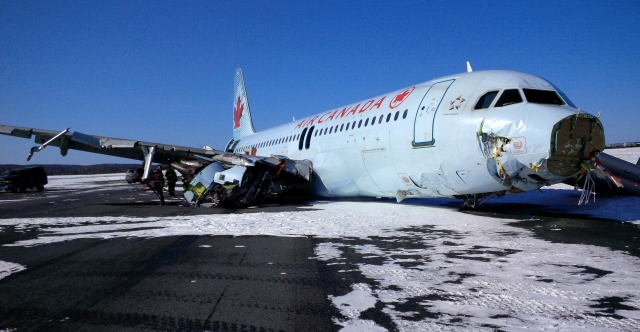
HALIFAX, Nova Scotia (AP) — An Air Canada plane made a hard landing short of the runway at the Halifax airport during a snowstorm, crashing into a bank of antennas and shearing off its main landing gear, nose cone, and an engine as it skidded on its belly, officials said. The airline said Sunday that 25 people were taken to hospitals for observation and treatment of minor injuries.
The airline said Flight AC624, an Airbus 320 that left Toronto late Saturday, had 133 passengers and five crew members. Air Canada said the aircraft landed in stormy conditions at 12:43 a.m. Sunday.
"They touched down 1,100 feet (330 meters) short of the runway so I'd say they're pretty lucky," Mike Cunningham, a regional manager for Canada's Transport Safety Board, told a news conference.
Cunningham said the plane hit an antenna array, shearing the main landing gear off before sliding on its belly onto the runway for another 1,100 feet before coming to a stop. Cunningham said there was significant damage to the plane and could not rule out weather as a factor. He also said he believes a power line was severed, which led to a loss of power at the airport.
Air Canada Chief Operating Officer Klaus Goersch said 25 people were taken to local hospitals and all but one of them were released.
"All of us at Air Canada are greatly relieved that there have been no critical injuries as a result of this incident," Goersch said.
The Transportation Safety Board provided pictures that showed significant damage to the plane with the nose torn off and an engine crumpled under a damaged wing.
"This was not a hard landing. This was an actual crash," said Mike Magnus, a 60-year-old businessman who was sitting in the first row. "It was the closest I've ever came to death. There is no doubt in my mind. Obviously that's some political maneuvering."
Magnus added that the snow covering the runway likely extinguished any sparks that might have caused the plane to catch fire.
Power went off at the airport. Nova Scotia Power later tweeted that power had been restored. Cpl. Greg Church of the Royal Canadian Mounted Police said a power line south of the runway was damaged. Halifax Stanfield International Airport spokesman Peter Spurway credited the crew and passengers for evacuating the plane within a minute.
"We just kicked the doors out and jumped onto the wing and then ran because we just wanted to get away from the airplane in case of explosions or anything," said Dominic Stettler, a father of three.
Some passengers complained they were left standing on the tarmac, some in their stocking feet, for up to 50 minutes as they were lashed by wind-whipped snow before buses arrived.
"People were just happy to be alive but after a while it got tiresome having to wait outside in the freezing cold. I only had a golf shirt on," Magnus said.
Spurway said the airport is reviewing its response.
The Halifax region was under a snowfall warning, with an Environment Canada alert saying, "Visibility may be suddenly reduced at times in heavy snow." Goersch, Air Canada's chief operating officer, said the weather was appropriate for landing.
"It was safe to fly in this weather. The aircraft did circle for a period of time but when the approach was initiated, the weather was at the approach limits," Goersch told a news conference. "The weather was appropriate for landing."
Randy Hall and his wife Lianne Clark were on their way home from a Mexican vacation when he said he believes the jet hit a power line before it landed hard on the runway. There were sparks but no fire, he said.
"We were just coming in to land and there was a big flash," said Hall. "The plane came down, bang! It jumped up in the air again."
The aircraft skidded for a long time before coming to a stop, said Hall, who is retired. "We were sliding along on our belly. ... I was looking out and I saw the landing gear go and I saw an engine go."
Flight tracking site Flightradar24 listed several cancelled flights at the airport Sunday morning.
___
Associated Press reporter Rob Gillies in Toronto contributed to this story.